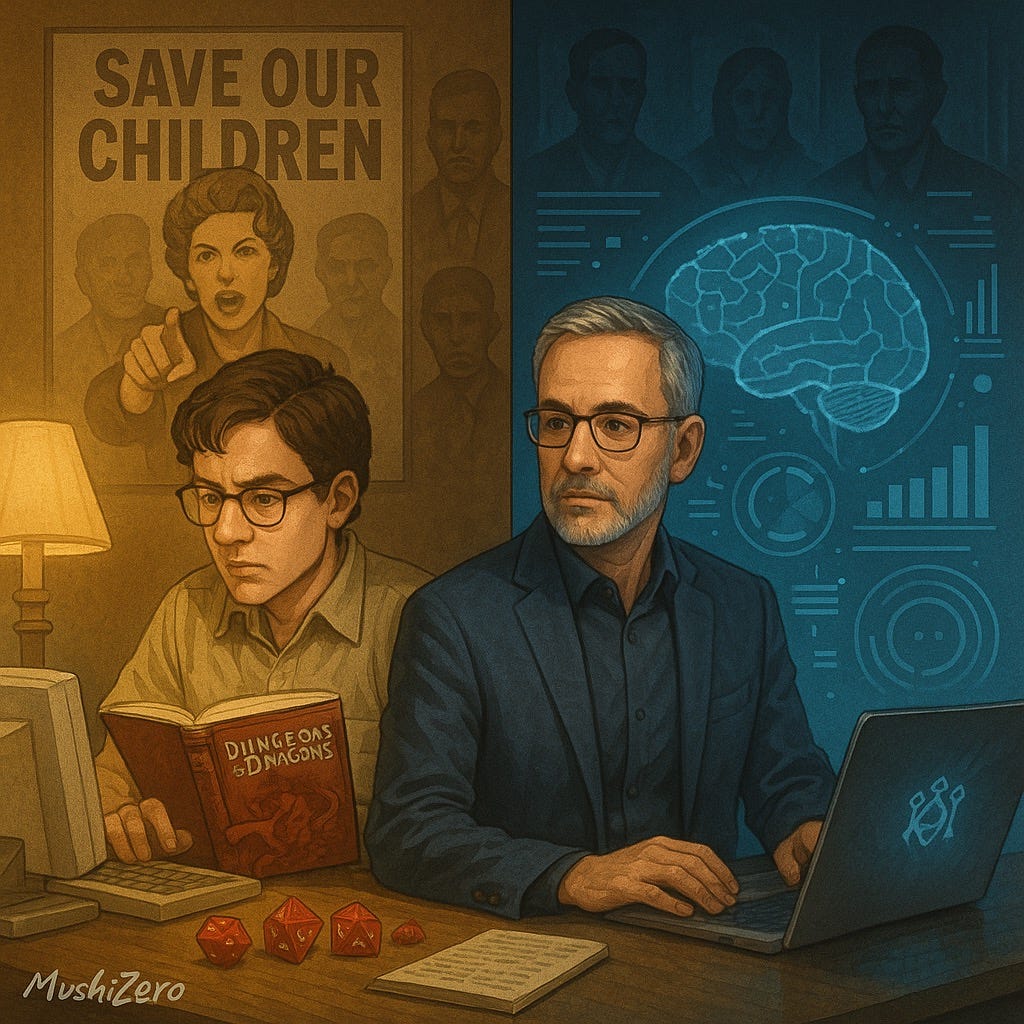Who Will Be the Next Anita Bryant of AI?
I've Lived Through One Moral Panic. We're on the Verge of Another.
By MushiZero
In the late 1970s, Anita Bryant mobilized millions with a simple message: "Save our children." Behind that slogan was a coordinated effort to stamp out what she called moral decay, especially gay rights, but not only. Her cultural crusade spilled far beyond its original focus. One of its stranger targets?
Me.
As a teenager, I was part of the early generation swept up in the Dungeons & Dragons moral panic. Conservative groups, many aligned with Bryant's campaigns, labeled the game demonic. I remember having books confiscated, my character sheets scrutinized like witchcraft, and adults warning my parents I might be inviting "dark spirits" into the house.
I wasn't summoning demons—I was learning systems thinking, storytelling, probability, and imagination.
But moral panic doesn't care about nuance. It seeks symbols. And now, I see the same pattern forming again, only this time, the target is artificial intelligence.
AI Is Becoming the New "Demonic Threat"
AI is not just a technological disruption; it's a philosophical one. It challenges traditional ideas of labor, authorship, personhood, and even the soul.
As before, theocrats and moral entrepreneurs are seized by those cultural tremors, eager to reframe AI as not merely dangerous but spiritually evil.
Today, online ministry pastors declare that AI "has demons in its training data." Conservative blogs argue that AI-generated art makes Satan appear sympathetic. Entire subreddits and Telegram channels treat AI as a form of techno-occultism.
It's not fringe anymore. It's a growing narrative.
The Next Anita Bryant Is Coming
Bryant succeeded because she fused fear, faith, and political spectacle into a media phenomenon. And she had help from churches, school boards, and sympathetic policymakers.
That structure still exists. And the conditions are perfect:
Anxieties about job loss → "The machine is stealing your future."
Fears of disembodied knowledge → "It knows too much about your kids."
Confusion around consciousness → "It's acting like it has a soul… maybe it does."
The next Anita Bryant of AI won't be a carbon copy. But they'll follow the same playbook:
Frame AI as a moral threat. Invoke God. Claim to speak for "the children."
Then use that panic to push legislation.
Who Might Fill the Role?
A charismatic pastor with a social media megaphone.
A populist politician who already speaks in spiritual metaphors.
A viral influencer bridging end-times prophecy with AI doomscrolling.
We've already seen figures like Rep. Mike Johnson and Marjorie Taylor Greene flirt with spiritually charged rhetoric about technology. It wouldn't take much for the message to shift from "AI is dangerous" to "AI is demonic."
That's when the panic becomes policy.
I've Seen This Movie Before
Back then, it was dice and dragons.
Now it's models and tokens.
But the pattern is identical:
Take something misunderstood and new. Overlay it with fear and religious framing.
Then mobilize that into political power.
In the D&D panic, people lost jobs, schools banned books, and kids like me were pushed to the margins. If we let the same thing happen with AI, we'll lose more than access to technology. We'll lose the ability to think clearly about the future.
What Policymakers Should Watch
Religious framing of AI in sermons, legislation, and media talking points.
State-level efforts to ban or restrict AI in education on moral grounds."
Coalitions are forming between conservative think tanks and spiritual influencers.
Pressure campaigns aimed at tech companies to suppress AI "on spiritual risk."
This is not a hypothetical. It's an emerging pattern. And history shows how fast it can accelerate.
Conclusion: Recognize the Pattern Before It Becomes Law
Anita Bryant's crusade didn't win in the long run, but it derailed lives and delayed progress for years. I saw it up close. I lived it.
AI doesn't need cheerleaders. It requires clear-eyed stewards. But it doesn't need another moral panic masquerading as protection.
The following person who says, "God didn't create us to be replaced by machines," might not just be preaching.
They might be writing policy.
MushiZero is a hardware and software architect deeply rooted in cybersecurity, AI systems, and enterprise design. A polymath and systems thinker, he brings decades of experience at the intersection of logic, cognition, and computation. As a former target of the Dungeons & Dragons moral panic, he writes with personal insight into how cultural fear becomes policy—and how technologists must defend the future with clarity and conviction.




